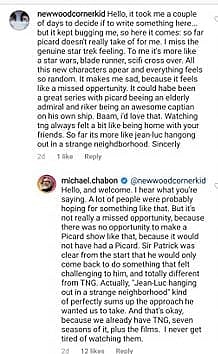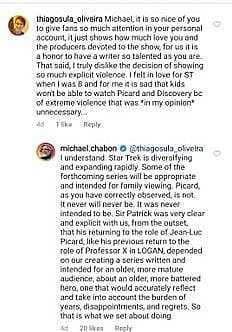Star Trek: Picard Showrunner Michael Chabon Addresses Fan Concerns Over Graphic Violence And Dark Tone
Star Trek: Picard showrunner and writer Michael Chabon recently did an impromptu Q&A on his Instagram where he addressed a number of fan concerns regarding the newly released Star Trek show.
Related: CBS Provides Major Update On Future Of Star Trek Franchise!
One fan commented and described the show felt more like a mash-up of Star Wars and Bladerunner rather than Star Trek. They added the show felt like a missed opportunity and that they missed “the genuine Star Trek feeling.”
Chabon responded by explaining the show would not have happened if it felt too much like The Next Generation because Patrick Stewart would not have returned.
“Hello, and welcome. I hear what you’re saying. A lot of people were probably hoping for something like that. But it’s not really a missed opportunity, because there was no opportunity to make a Picard show like that, because it would not have had a Picard. Sir Patrick was clear from the start that he would only come back to do something that felt challenging to him, and totally different from TNG. Actually, “Jean-Luc hanging out in a strange neighborhood” kind of perfectly sums up the approach he wanted us to take. And that’s okay, because we already have TNG, seven seasons of it, plus the films. I never get tired of watching them.”

A number of fans questioned why the series featured so much extreme violence.
Chabon, again put the blame on Patrick Stewart, indicating he demanded a “series written and intended for an older, more mature audience.”
He explained:
“I understand. Star Trek is diversifying and expanding rapidly. Some of the forthcoming series will be appropriate and intended for family viewing. Picard, as you have correctly observed, is not. It never will never be. It was never intended to be. Sir Patrick was very clear and explicit with us, from the outset, that his returning to the role of Jean-Luc Picard, like his previous return to the role of Professor X in LOGAN, depended on our creating a series written and intended for an older, more mature audience, about an older, more battered hero, one that would accurately reflect and take into account the burden of years, disappointments, and regrets. So that is what we set about doing.”

Chabon would go deeper into the questions regarding the show’s violence and pointed to how violence and torture have been used in past Stat Trek iterations such as The Next Generation, Deep Space Nine, and Enterprise:
“I am not unambivalent about the violence, myself. The choice was not made lightly, though it was made collaboratively, and therefore with a good deal of conversation and debate among the creators. And so I assure you that it is not there simply “because we can,” or because we are trying, as you somewhat uncharitably put it, to be “in.” My partners would all have their own reasons for its presence in this story, as some of us had our own reasons for shying away from it. For me, it came down to this: there has always been violence (and even torture) in Star Trek. Sometimes that violence has been implicit, sometimes explicit, according to the dictates of censorship, the nature of the situation being depicted, the aesthetic of individual creators, or technical and/or budgetary limitations. And the reason that there has always been violence in Trek is that Trek is art, and there has always been violence—implicit and explicit—in art. It belongs there. It belongs in any narrative about human beings, even human beings of the future.”

He continued:
“Violence, often, *is* the narrative. Its source. Its engine. The question of whether it’s “too much” or not is ultimately a matter of taste. Personally, I come out closer to the “less is more” end. But that is just me. In the end, I saw how little time and space we had to convey a sense of Seven’s history post-Voyager, and the things that drive and haunt her. I decided, with my partners, that intensity was warranted. Seven lives outside the rational confines of the Federation, because that is where she finds her sense of purpose. But life is hard, out there. If it wasn’t, people wouldn’t need her help so badly. And she wouldn’t have found such a compelling reason to carry on, in spite of her history of trauma. But, I hear you.”

Michale Chabon isn’t technically wrong.
Some classic episodes, which later became memes do show that this has been the case. One such case is the two-part episode “Chain of Command.” Picard gets captured by Cardassians and is subjected to torture in an attempt to break the revered Star Fleet officer:
In the “The Mind’s Eye,” Geordi is also captured by Romulans and is subjected to a form of torture and brainwashing:
In the Enterprise episode “Kir’ Shara,” Sharan tortures Soval by manipulating the Vulcan’s emotions:
https://www.youtube.com/watch?v=ulmH7DxQEKI
Violence and torture have been used in Star Trek in the past. However, the change in the tone of the franchise seen in Picard to shift to a more “mature” audience is new. It’s something that I personally find outrageous. The idea that increasing the intensity of violence makes Star Trek more mature is silly.
The idea that Star Trek needed to put gratuitous violence in Picard to appeal to a more mature audience is silly as well.
Star Trek has always been a mature franchise. It’s tackled subject matter most other franchises wouldn’t even touch because either they didn’t know how or were afraid of pushing fans away.
For example, episodes such as “Measure of a Man,” “The Drumroll,” “The City on the Edge of Forever,” and “In The Pale Moonlight” all have themes that are mature and deal with very deep subject matter. These episodes did not require the crutch of intense violence to appeal to a mature audience.
Instead, it feels that the current architects of Star Trek are hoping to draw in fans of dystopian science fiction by “borrowing” elements of shows such as The Expanse and Altered Carbon.
It’s admirable that Michael Chabon is as interactive with fans as he is. Though for some like myself his answers feel a bit empty, I do commend his willingness to face people’s criticisms and concerns.
I want to hear from you, what is your opinion of Star Trek: Picard and current Star Trek in general? Let me know both in the comments and on Twitter, let’s get a conversation going!
